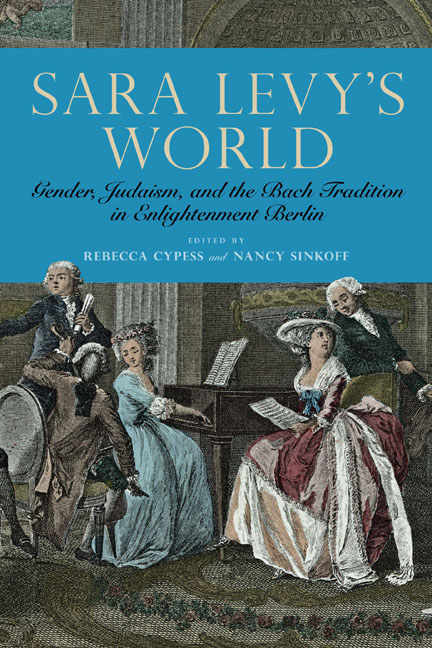Book contents
- Frontmatter
- Dedication
- Contents
- Acknowledgments
- Introduction: Experiencing Sara Levy’s World
- Part One Portrait of a Jewish Female Artist: Music, Identity, Image
- Part Two Music, Aesthetics, and Philosophy: Jews and Christians in Sara Levy’s World
- Part Three Studies in Sara Levy’s Collection
- Appendix: The Salonnière and the Diplomat: Letters from Sara Levy to Karl Gustav von Brinckmann
- Bibliography
- List of Contributors
- Index
5 - Lessing and the Limits of Enlightenment
Published online by Cambridge University Press: 21 April 2021
- Frontmatter
- Dedication
- Contents
- Acknowledgments
- Introduction: Experiencing Sara Levy’s World
- Part One Portrait of a Jewish Female Artist: Music, Identity, Image
- Part Two Music, Aesthetics, and Philosophy: Jews and Christians in Sara Levy’s World
- Part Three Studies in Sara Levy’s Collection
- Appendix: The Salonnière and the Diplomat: Letters from Sara Levy to Karl Gustav von Brinckmann
- Bibliography
- List of Contributors
- Index
Summary
This chapter is reprinted from Martha Helfer's book, The Word Unheard: Legacies of Anti-Semitism in German Literature and Culture (2011), about latent anti-Semitism in the classical German literary canon. Helfer's study treats German literary texts that were produced and read between 1749 to 1850, when the issue of Jewish political emancipation was fiercely debated among German political thinkers, writers, religious figures, and other intellectuals. This chapter reconsiders the literary legacy of the great Enlightenment author Gotthold Ephraim Lessing (1729–81), Germany's most famous advocate of religious tolerance and an icon of interfaith friendship. Reexamining Lessing's three major works promoting tolerance toward Jews and Judaism— his theological treatise, The Education of the Human Race (1780), and two plays, The Jews (1749) and Nathan the Wise (1779)—Helfer claims that there was a persistent tension running throughout this oeuvre, which helped to shape the rhetoric of anti-Semitism that subsequently informed modernizing German culture's views of Jews and Judaism. In shedding new light on the ideals of tolerance for which Lessing stood, Helfer's chapter offers a complex view of crucial aspects of Sara Levy's world.
The Word Unheard begins with a necessary provocation: Lessing and latent anti- Semitism. The great Enlightenment playwright and critic Gotthold Ephraim Lessing was unequivocally a pro-Jewish author and political activist. Lessing was very likely the sponsor of the first published document calling for the full emancipation of the Jews in Germany, and his theological and dramatic writings on Jews and Judaism form the de facto benchmark of pro-Jewish discourse in German letters. Lessing's influence on German literature and culture is profound. Just as every Jewish character in Western literature in some sense references Shakespeare's Shylock, every Jewish character in German literature in some sense references Lessing's Nathan the Wise. Lessing's merchant Nathan is a good Jew, a wise Jew, the embodiment of Enlightenment who famously advocates tolerance for the three great monotheistic religions, Judaism, Christianity, and Islam. Lessing's Nathan is so good, so wise, and Lessing's reputation as a pro-Jewish German cultural icon so strong, that the Nazis peremptorily prohibited the production of the play at the beginning of the Third Reich in 1933. After the war, in 1945, many German theaters reopened with Nathan the Wise, the symbol of tolerance and Enlightenment humanism, and the play is still one of the most frequently performed on the German stage today.
- Type
- Chapter
- Information
- Sara Levy's WorldGender, Judaism, and the Bach Tradition in Enlightenment Berlin, pp. 99 - 121Publisher: Boydell & BrewerPrint publication year: 2018

